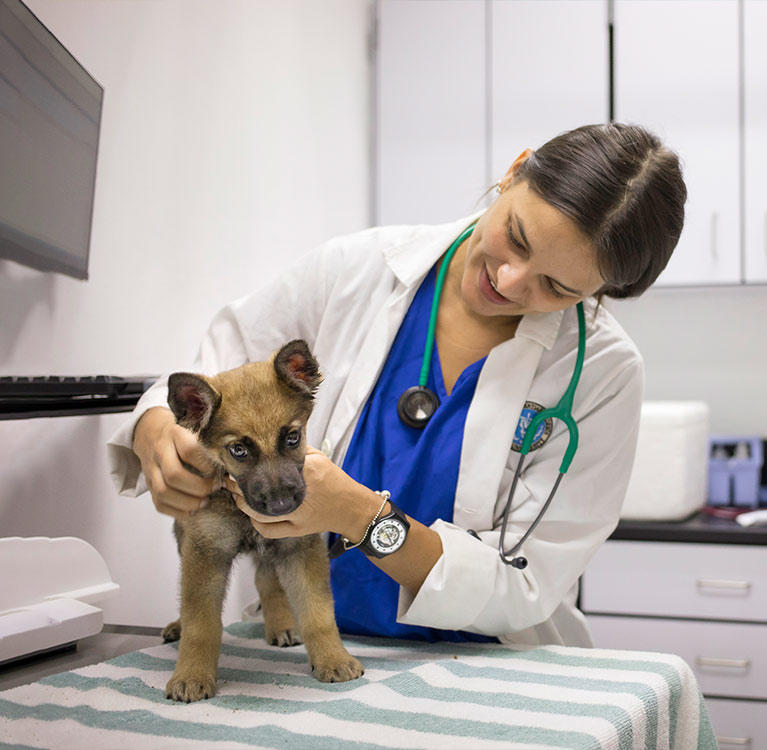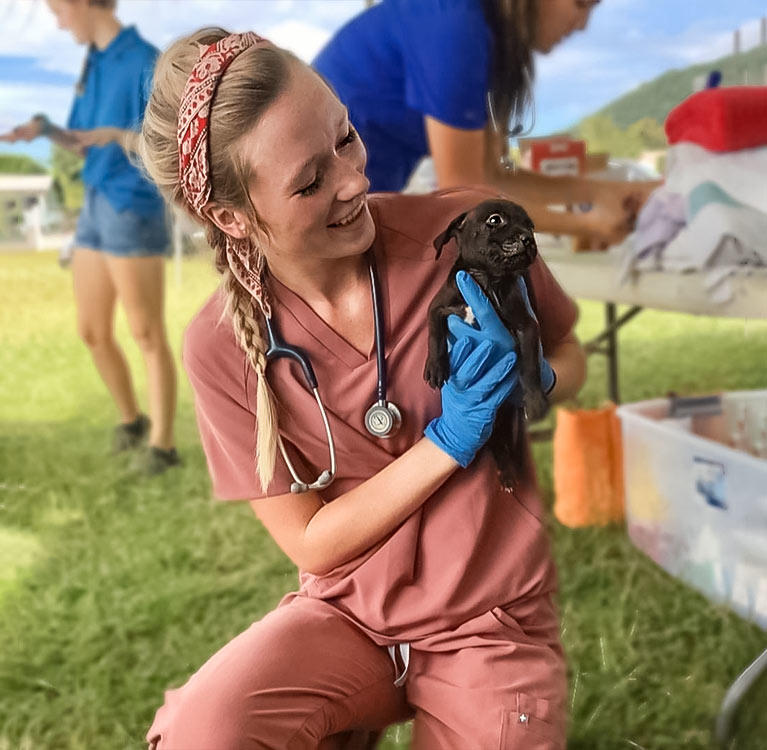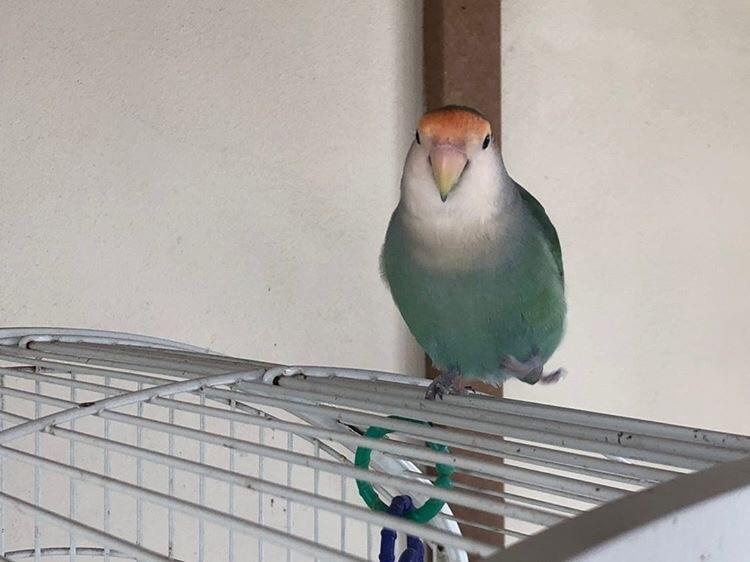Growing up, if you said to yourself over and again, “I want to be a veterinarian,” it’s probably because you love animals and have a passion for caring for them. Now, as you actually consider becoming a Doctor of Veterinary Medicine (DVM), you want to know how to make yourself a good candidate for acceptance into an accredited vet school such as Ross University School of Veterinary Medicine (Ross Vet). As with any institution of higher learning, you’ll begin by completing an application for admission, but your preparations for vet school should have already started.
Specific veterinary school requirements vary from school to school, but a few steps can make the application process—which may seem intimidating—a little easier. Read on for the most important vet school requirements as well as tips and strategies to help your veterinary application go smoothly—and help you stand out from other applicants.
REQUIREMENTS FOR GETTING INTO VET SCHOOL
Below is our table of contents for each vet school requirement. You can follow along in order or skip to a specific section by clicking one of the requirements.
- Complete your undergraduate course prerequisites
- Document your experiences working with animals
- Complete your Graduate Record Examination® (GRE®)
- Know your application deadlines
- Craft your personal essay
- Reach out early for letters of recommendation
- Be specific and detailed
- Submit your application with confidence
1. COMPLETE YOUR UNDERGRADUATE COURSE PREREQUISITES.
Your application for admission to vet school requires you to do some work ahead of time, including meeting all veterinary school prerequisites while you are still an undergraduate. You can apply to vet school before you graduate, but you’ll need to show that your bachelor’s degree is on its way.
Vet school prerequisites vary from school to school, RUSVM’s veterinary school prerequisites, for example, require a minimum of 48 credits of college work through eight different subjects.
And speaking of bachelor’s degrees, many students are curious to know which one will serve them best when applying for vet school. The answer is: the degree and major are up to you. Most schools, however, recommend undergraduate degrees in one of the following:
- Biology
- Animal science
- Biological sciences
- Biomedical sciences
There are various course prerequisites depending on the vet school. For more details, visit the AAVMC’s Summary of Course Prerequisites page.
“Evaluating transcripts is not just about grades (although they are important and you have to have a C or better in the prerequisite courses); we also look for evidence of learning maturity from year to year—solid performance even as courses become more difficult,” says Ross Vet Associate Director of Admissions Ruth Schroeder.
Ross Vet takes a holistic view of the admissions process, reviewing not just grades and test scores, but also giving weight to experience, perseverance, and the passion to become a veterinarian. But remember, some schools still have minimum grade point average (GPA) requirements, both for your science courses and overall. Ross Vet doesn’t set an overall GPA minimum, but the average cumulative GPA for enrolled vet students is 3.24*.
Helpful tip: Focus on core undergraduate science and math courses to help boost your vet school preparedness.
*Statistically representative of the September 2022, January 2023, and May 2023 incoming classes. Data includes both new and advancing Vet Prep students.
2. DOCUMENT YOUR EXPERIENCE WORKING WITH ANIMALS.
You are passionate about animals and animal welfare—and vet schools want to see proof! Documenting your experience working with animals is a very important part of your application. Most schools require a certain number of hours of veterinary professional experience. At Ross Vet, the minimum is 150 hours, but don’t hesitate to do more than that. If you can, try to gain experience working with a variety of animals, both large and small, to demonstrate your versatility and curiosity. Some schools may wish to see a breakdown of your experiences.
When looking at vet school requirements, note if the school wants all your hours to be completed under the supervision of a practicing veterinarian, or if it will consider general animal experience such as volunteering at a local animal shelter. At Ross Vet, we prefer professional experience under the supervision of practicing veterinarians, but we do take into account other animal experience as well.
Helpful tip: Shadow a vet! Aside from the great experience, a vet who gets to know you and your passions and abilities couldprovide a crucial letter of recommendation (see No. 6 below).
3. COMPLETE TEST REQUIREMENTS FOR YOUR SCHOOL.
Test requirements vary depending on the school. Data from the AAVMC shows that for 2023-24 AVMA-accredited vet schools:
- 33 schools have no test requirements
- 13 schools require the Computer-Based Assessment for Sampling Personal Characteristics™ (CASPer™) test
- Two schools require the Graduate Record Examination® (GRE®)
GRE FOR ROSS VET APPLICANTS AND GENERAL GRE TIPS
The GRE is highly recommended, but not required for Ross Vet applicants. Applications that include the GRE, regardless of GRE score, will be given priority in the review process.
Preparation is key to doing well on the GRE. Practice makes taking the GRE less intimidating and may help increase your eventual score. Performing well on the GRE couldhelp strengthen your application. It’s not unusual to struggle through the first few practice exams. If you feel like you’re still struggling after a few tries, it may be worth signing up for a practice or mentor course. Many courses are available locally or online. ETS, the testing service that administers the GRE, has a few suggestions.
“The GRE is about test-taking strategy and the ability to critically think through the questions; even if you don’t know the answer, based on what you do know and the answer options available, arrive at the best possible answer by figuring it out. The GRE provides the admissions committee evidence of your ability to think critically and problem solve,” says Schroeder.
Helpful tip: Start early and practice, practice, practice!
4. KNOW YOUR APPLICATION DEADLINES.
Getting into vet school is all about preparation. Mark your application deadlines on the calendar and get organized. You can apply year-round at Ross Vet for our three flexible start dates in January, May, or September. You can also apply through the open Veterinary Medical College Application Service (VMCAS) cycle dates.
Helpful tip: Map out your full application timeline and try to beat your deadlines well ahead of time.
5. CRAFT YOUR PERSONAL ESSAY.
Whether you apply through VMCAS or directly through your school of choice, you will likely need to submit a personal essay or statement. Often, your essay will be a response to essay prompts related to your career goals and personal qualities. Some personal essays are limited to 300 to 500 words—that really isn’t very long, just four to six strong paragraphs. Your essay should be concise and well-written.
Writing, especially about yourself, can be overwhelming. Take your time. Reflect on your passion for animals and really think about why you want to be a vet. Then prepare two or three talking points you want the admissions team to understand about you and your particular goals.
As you consider why you want to become a veterinarian, be sure to give thought to other passions beyond a love of animals. You can love animals and care about them and not be a veterinarian! So, think about the role veterinarians play—they are clinicians (diagnosing and treating); they are educators (to their clients and staff); they are also researchers, business operators, and important members of the community. Also, give thought to the wide variety of career options available to someone with a DVM degree.
Helpful tip: Don’t sweat the essay! Get to the point and let your personality shine through. Find more personal statement tips in our post here.
6. REACH OUT EARLY FOR LETTERS OF RECOMMENDATION.
At Ross Vet, we require two letters of recommendation: one from a veterinarian familiar with your animal experience, and one from a science professor familiar with your academic ability. If applying through VMCAS, you’ll need three letters of recommendation. Be sure to double-check the requirements at your school of choice to make sure you have enough letters.
After you know how many letters you’ll need, it’s important to choose the right evaluators who can speak to your critical thinking skills, your dedication to the profession, and your positive qualities. Some schools prefer letters from veterinarians and science professors, so develop positive relationships with both. Let them get to know you so they can write a meaningful letter that provides evidence, with specific details and examples, of your ability to be successful as a DVM student and later as a veterinary professional. Now is the time to reach out and ask for letters of recommendation.
Schroeder says, “Letters are critically important as they provide additional evidence, from respected professionals, of your ability to be successful academically and professionally. It is also an opportunity for those evaluators to speak to your ‘soft skills’ such as teamwork, leadership, professional communication, self-confidence, initiative, and maturity.”
Helpful tip: Don’t wait until the last minute. Reach out early to give your evaluators enough time to put together a thoughtful letter of recommendation.
7. BE SPECIFIC AND DETAILED.
When applying to vet school, always address school-specific requirements. A review of your application and any interviews may be delayed until your application is complete. Review the specific requirements for how to get into vet school early on so you don’t leave anything out. Then, review the vet school requirements again.
Helpful tip: The American Association of Veterinary Medical Colleges (AAVMCTM) maintains Veterinary Medical School Admission Requirements, a comprehensive guide of member schools. You can see the breakdown of each school’s prerequisites—including those of Ross Vet—in the VMCAS Summary of Course Prerequisites.
8. SUBMIT YOUR APPLICATION WITH CONFIDENCE.
Your vet school application has a lot of moving pieces. Download or log in to the application well in advance so you are fully prepared to address each section. Pay close attention to the sections that require documents to be uploaded and make sure you’ve paid any required application fees.
While you wait to hear back on your application, start practicing for your interviews. Practice makes perfect and schools want to see you shine in your interview. Ross Vet offers some useful interview advice.
Helpful tip: Practice your interview with your veterinary or work supervisor or, even better, a graduate of your vet school of choice. The more you practice, the more capable and confident you’ll come across to the admissions committee.
Still wondering “What do I need to get into vet school?” and “What are the requirements to become a veterinarian?” Reach out to the Ross Vet admissions team for answers to these questions or any others you may have.








